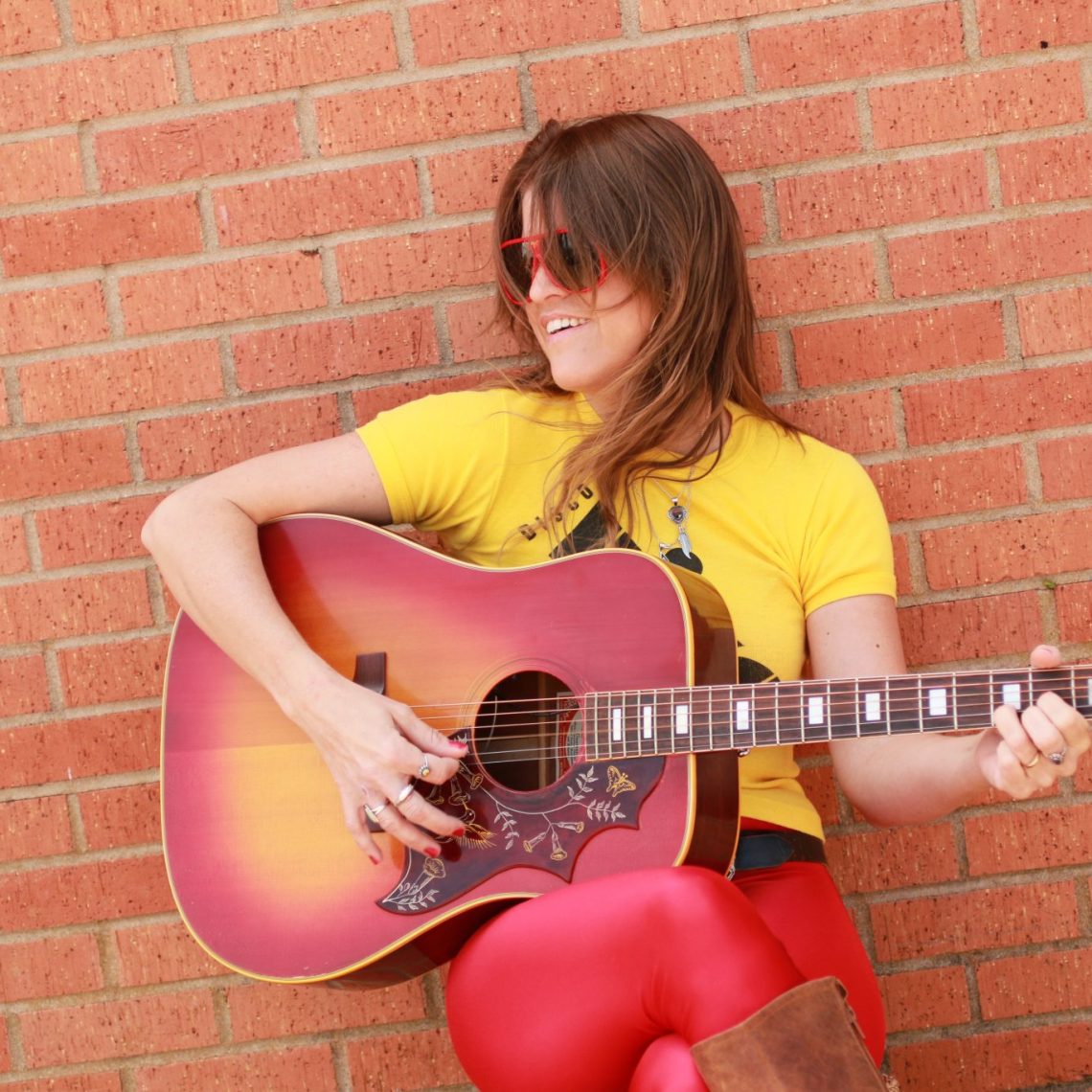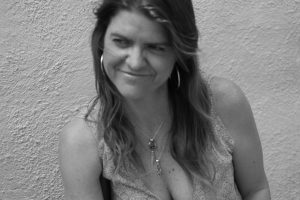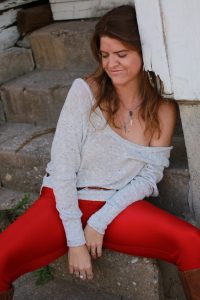By Richard Skanse
(LSM July/Aug 2014/vol 7 – issue 4)
The Devil’s Backbone Tavern in Fischer, Texas is the kinda place that looks pretty much exactly like you’d think it would. Not necessarily dangerous or menacing — certainly not at 5 p.m. on a weekday, when the amiable bartender calls you “Hon” and the happy-hour crowd consists of a single table of laid-back, silver-haired locals nursing Lone Stars, Pall Malls and small talk. But definitely weathered and worn, with every wooden surface inside its long stone walls — bar, stools, tables, floorboards, even the ceiling — carved, scarred and seasoned by generations of patrons living and dead. It’s the kind of place where a matter-of-fact “ghost warning” sign seems no more incongruous than the shuffleboard table, and that lights up a woman like Robyn Ludwick the minute she walks through the door.
“Don’t you love this place?” she enthuses after ordering her own Lone Star, selecting a little Vern Gosdin and Conway Twitty from the jukebox, and cracking a side door to take an admiring peek into the large adjacent — and very dusty — dancehall. “This is the coolest part of the bar, but its been closed forever,” she says wistfully. “I really wish somebody would do something with it — it’s gorgeous.”
Ludwick has lived a few miles away in Wimberley with her husband and two kids since 2003, but the Devil’s Backbone has been one of her favorite Hill Country haunts for more than 20 years. “I’ve been coming here since I was in high school, when my brother Bruce was going to Southwest Texas and I would come stay with him during the summer,” she says. Even then, the old beer joint felt like home.
“My mom was a bartender for a long time in Bandera when we were kids,” she explains, waxing nostalgic and bittersweet in equal measures, “so we spent a lot of times in bars and dancehalls.”
Her older sister — aka the “white sheep” of the bunch — managed to grow up and out of that world. Not so Robyn and her two older brothers, Bruce and Charlie Robison.
Although their dad was a coach and all three of them were jocks for a spell (“I set a record for the most 3-pointers in one game,” she says proudly), one by one they gravitated toward the neon-lit nightlife. But the lure had very little to do with mother (they’re estranged) and almost everything to do with music. In Robyn’s case, it came down to a virtual showdown between her two favorite female role models as a teenager — and pitted against Lucinda Williams, Texas All-American hoop star Clarissa Davis ultimately didn’t stand a chance. As Ludwick would tell Gurf Morlix years later when she approached him about producing her third album, 2011’s Out of These Blues, “I wanted to be Lucinda Williams when I was 15 years old, which was probably one of the reasons why I started playing guitar and doing bad girl things.”
But although getting into trouble proved easy enough for her, young Robyn originally didn’t get very far in her “Becoming Lucinda Williams” manual. She stopped short at the “fall in love with a bass player” chapter and ended up marrying one John “Lunchmeat” Ludwick, 11 years her senior, when she was 20. Her brothers, both already well along their way with their respective songwriting careers, were less than amused. “They never forgave me for that,” Robyn says with a laugh, still happily married 21 years later. “And I don’t know who else they would have liked me to be with — they love Lunchmeat. But it was like I had broken their hearts because I went and married the bass player.”
And yet somehow, they all got through it OK as family. Lunchmeat remained Bruce and Charlie’s go-to bassist, and Robyn even ended up singing on some of their records as well. That was apparently just enough to scratch what was left of her music itch, though, because she spent the rest of her 20s happily finding her feet in a very different world: forensic engineering. “I actually got my degree in civil engineering, from UT, but I started studying this kind of exotic form of engineering under a guy who was one of the lead expert witnesses in the state, and I found it fascinating,” she explains. “Forensics is sort of the creative side of engineering, because it involves a lot of going-backwards problem solving and failure analysis. It’s almost like the CSI of engineering. And I figured out that I was good at it.”
She started her engineering career proper in 1998; a few years later she and Lunchmeat had their first child, sold their small house in Smithville and found their new place in Wimberley. Life was good. And then she got laid off.
“Long story short, mold happened,” she says. A lot of her job at the time had entailed doing residential foundation claims for insurance companies, and in the wake of “that first big mold case in Dripping Springs that changed history,” a lot of engineering companies that did insurance work were wiped out.
“I thought it was the end of the world, because I got laid off 24 hours before we were supposed to close on our house,” she says. “And I took it personally because I was young at the time, and I had a baby and a bass player for a husband — it was fucking scary, you know? We were able to close on the house and move into this very beautiful community, but I had to cash in all the retirement I had at the time. And then we had this total health scare with my little boy, where I’d read a lot of these potentially very scary type diagnoses, and I just didn’t sleep for like six months …”
It wasn’t until then, at 31 years old and at the end of her emotional rope, that Robyn Ludwick started writing songs. And once the floodgates were opened, she couldn’t stop.
“All of these things just kind of hit me at once, so a lot of it was very personal and heavy,” she says of those first songs that came rushing out. “It was a combination of everything I was going through at the time, plus all this other stuff, going all the way back to my childhood, that I had never really got out of my system before because we never had money to get any kind of therapy. We all went through a lot of crazy stuff growing up — a lot of it dealing with our mother — but there was no like, getting anything ‘worked out’ when you were a kid in the ’70s; you just survived or you didn’t.”
She remembers being “frightened as hell” the first time she sang any of her songs for her brothers, both of whom were at the top of their game at the time. Bruce recalls being rather nervous himself.
“I think I was scared of whatever it was she was about to do, because she sat me down and it felt like an intervention,” he says. “But then she played me a few songs, and it was amazing. I hadn’t heard them at all before that and didn’t even know she was writing, but they were all obviously really good and very intense — way more than mine. She delves pretty deep into our history and stuff in a lot of them, and they were all so well put together. So it was a really powerful moment when she played those for me.”
Bruce sings “Departing Louisiana,” a song from Robyn’s 2005 debut, For So Long, at the beginning of Our Year, his new duo record with wife Kelly Willis. Charlie recorded two of his sister’s songs, “Monte Carlo” and “Out of These Blues,” on his 2013 covers album, High Life. He first heard “Monte Carlo,” a song about their mother, when Robyn played it at a Robison family song-swap at Steamboat; after she finished it, he got out of his chair and walked over to kiss her onstage. “Out of These Blues” was a song she wrote for him when he was going through his divorce — but he waited the better part of two years before listening to it, knowing full well how deep and true his sister’s loving but unflinchingly honest words would cut.
“I wrote ‘Out of These Blues’ for Charlie because his whole persona, his talent really, is convincing people that he’s the king of the world, that he doesn’t give a shit,” says Robyn. “And he’s a lot of people’s hero because of that, including mine. But at the same time, I’m his little sister and I know when he’s hurting. And he and I don’t always communicate in the ways that we should, but that song was like an unspoken, you know, ‘I’m hurting because I know you’re hurting, and this is my homage to you … this is me saying I love you, but it’s also about how fucked up you are!’”
Par for her course, Ludwick pulls no punches on the new Little Rain, her fourth album and second produced by Morlix. And no target, no matter how dear to her heart, is too close to home. In “Heartache,” for instance, she addresses head-on some of the most personal struggles that come with the territory of spending more than 20 years married to your best friend. “It’s been so long now, forgot how sweet love once was,” she sings with frustrated anguish. “I hope you’re picking up what I’m putting down/I’m growing tired of all this round and round and round and round …”
“In a way, it’s kind of fucked up that that’s the only way I can communicate sometimes,” she admits with a laugh. “I should be able to just go, ‘This is what I need and what I want and what hurts me,’ but I can’t because I’ve got all these walls and shit. But music is my way of breaking those down, and sharing with people that think I have this really tough exterior or that I have the world by the balls — that I really don’t. I’m struggling and battling things just like everybody else.
“A lot of my songs, starting from my first record through to this one, are all sort of an amalgam of my past,” she continues. “And maybe they’re not all about me in particular, but there’s a lot of family stories and a lot of underdog stories. Like ‘Longbow, OK,’ which is about a young girl in a small town with no options and lot of difficult adult situations around her, and she’s a total survivor. All of that is a lot like my life, except that I was never actually molested. So I’ll go to extremes like that sometimes; it’s like making a movie — you have to have a balance. But overall I’d say it’s about 75-percent fact and 25-percent fiction.”
Although Little Rain has only been out since mid July, Ludwick already has her next record — a duet album with Australian singer- songwriter/guitarist/producer Bill Chambers (father of Down Under Americana star Kasey Chambers) in the can. “We still need to do some overdubs, but it’s pretty much done,” she says. “We did half of it in Australia back in January, and finished it in May at 12th Street Sound in Austin when he was in town.” Tentatively titled Mr. Saturday Night, she expects it’ll be out in early 2015.
“Bill and I met a few years ago when he was in Austin producing an Australian singer-songwriter who was a fan of mine,” she says. “The guy wanted me to sing on his record, and I wasn’t sure at first, but I did it to meet Bill because I was such a huge Kasey Chambers fan since the ’90s. After that we kind of kept in touch and came to realize we had a lot in common; it’s funny how you tend to relate very quickly to other musicians who come from a musical family. Because it can be pretty tough, you know? It’s a curse and a blessing.”
Indeed, Ludwick admits that from day one, she’s made a concerted effort — “almost to the point of professional suicide” — to not lean or bank on the Robison family name in regards to her music. “I love where I’m from, and my brothers have always been encouraging and supportive, but I just went way beyond what probably anybody else would to make sure that, in my mind, nothing was ever handed to me when I got up onstage,” she says. “I was that way to the point of just completely neurotic behavior, but it was really important to me. So when people found out and would come up and say things like, ‘My gosh, I had no idea,’ it always made me so happy. And then I would start gushing with pride that I was part of this musical family, because I was able to sort of be independent and on the same playing field.”
The fact is, though, that for as long as she’s been writing songs, making records, and playing on stages as far from home as Australia and all over Europe, Ludwick’s not only proven she can keep up on that same playing field as her older brothers, but do it all while also juggling the responsibilities of a demanding day job. Not long after the lay off from her first engineering job that sparked her songwriting career, Ludwick found gainful employment with another engineering company.
“The nice thing about having my engineering career is, it has really allowed me the freedom and ability to say ‘no’ to a lot of things in the music business,” she says. “And sometimes that’s a powerful thing — to not have to fall into the habit of, you know, doing every gig. I think that’s actually helped me get to where I am now as fast as I have, because perception can really be a huge part of this business.
“But at the same time, though, sometimes I do find myself wondering, ‘God, what could I do if I actually had all that extra time to write? How far could I go then?’” she admits. “And it’s getting to the point where things are really starting to happen for me, and on the engineering side they’re starting to be like, ‘We’re not really cool with you leaving six times a year to go touring outside of the country.’ So, maybe it’s a sign: Do I give up opportunities and play it safe, or take a leap of faith?”
That’s the question Ludwick leaves on the table at the Devil’s Backbone. Two weeks later, on July 3, she reports back via email with her decision.
“Guess what? I quit last week — how’s that for a plot twist?” she writes with a smiley. “Brave or stupid? Only time will tell.”








No Comment